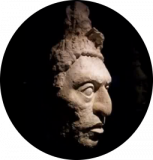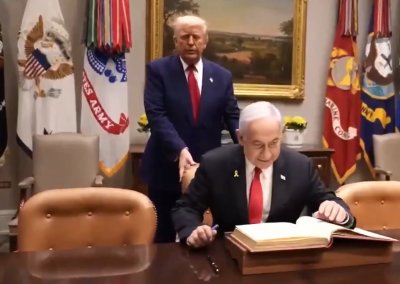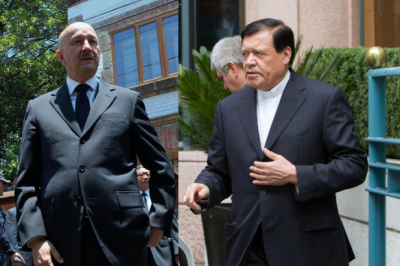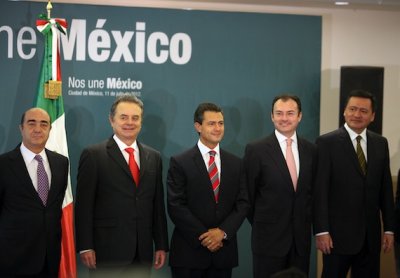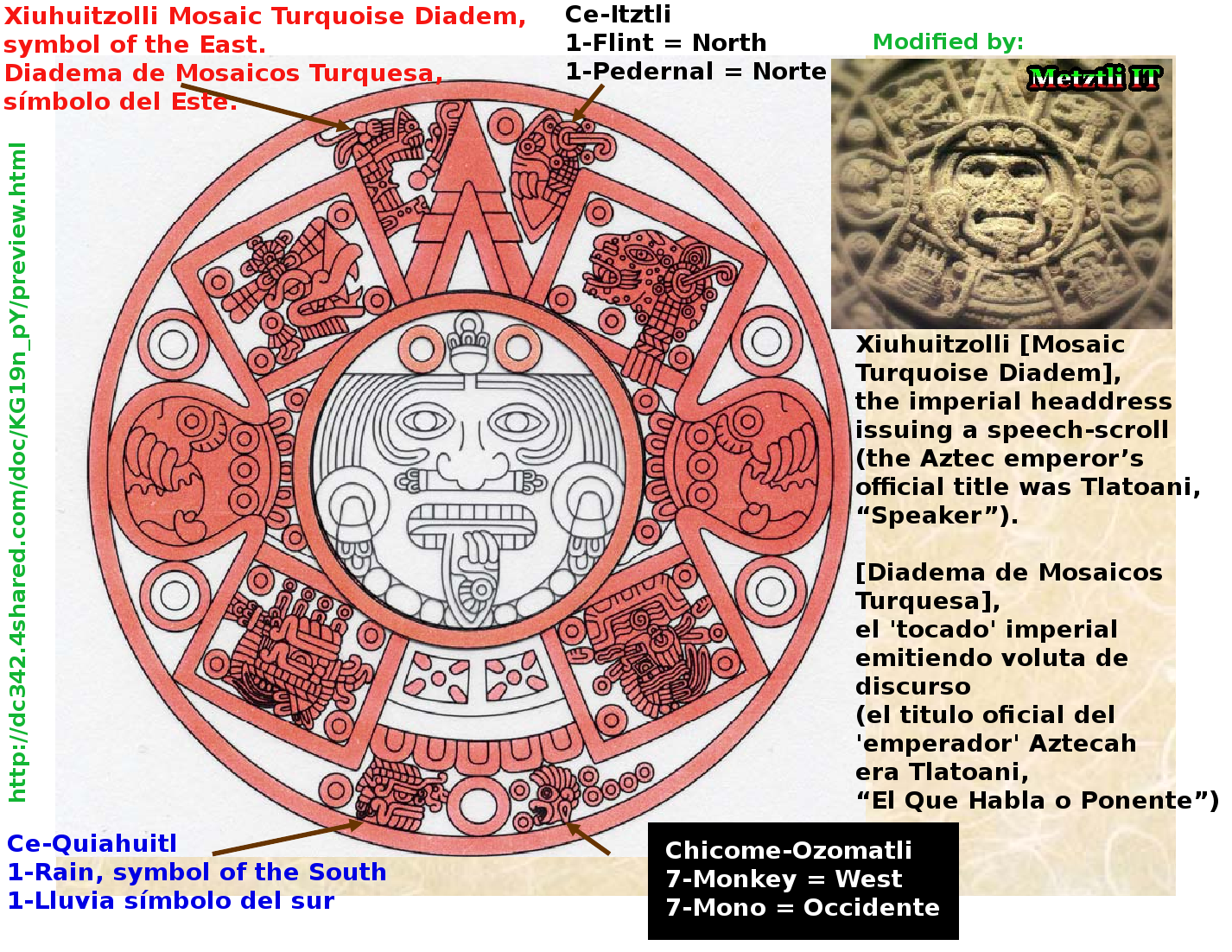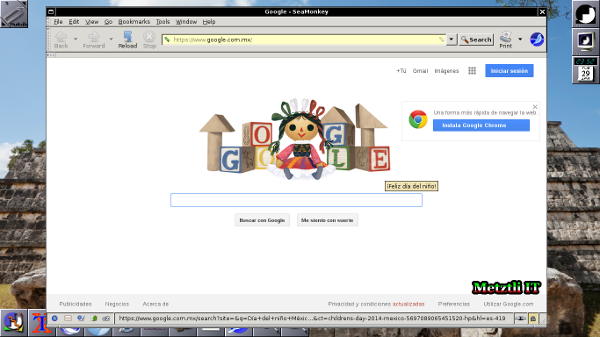Categories: "Mexico"
Dear European Americans
By Jose on Sep 18, 2025 | In occidente, Tlalnepantla, Mexico, Ixachitlal, West, Cemanahuac | Send feedback »
Dear European Americans
If you are European American who is currently trying to escape the United States, and calling Mexico your new home, please stay. This one is for you.
There is a deep anger in me that I will try to put into gentle words so that you may understand it. Although I must admit this conversation is going to be difficult.
Dear European Americans, let me be clear, this is not a polite request, this is a reckoning. For generations your people have displaced, dehumanized, and erased mine.
Long before the Treaty of Guadalupe Hidalgo, you invaded Mexican territory with violent entitlement. You burned, lynched, and terrorized Mexican people in your pursuit of 'Manifest Destiny'.
You took half of our territory by force then had the audacity to treat the people you displaced as 'illegals'1
-- as outsiders and/or 'illegal aliens' -- in the very land that you stole from under their feet. After the treaty, you promised rights to Mexicans who suddenly found themselves living under the United States.
But instead, you delivered broken promises, racial violence, segregation, more land theft, and systemic exclusion. You lynched Mexicans by the thousands, you banned our language in schools, you denied us access to the institutions built on our very own land.
During the 'Great Depression' millions of Mexicans -- many of whom were US citizens – were 'repatriated' in mass deportations, meant to scapegoat us for your economic failures much like the 'Zio- cock lover small time Hitler wannabe', D̶o̶n̶a̶l̶d̶ Adolf Trump, is doing today utilizing his terrorists, masked goons. We were used, discarded, and blamed; sounds awfully familiar, does not it?
And, yes, now under the thin skinned fascist bastards in the Trump Administration we are being hunted again: caged, separated from our children, our humanity questioned, our people made into political punching bags so white supremacy can breathe easier.
And while this war rages on against my people, many of you – the same ones who voted-in this Zio- Nazi regime, who is terrifying my people, who helped them orchestrate this cruelty -- are fleeing to Mexico, colonizing it again!
You come with your dollars, your airbnb's, your refusal to learn Spanish, your gentrifying process. You are displacing the very people your country is torturing. You inflate rents, drain resources, push out locals, and then demand to be served with the same entitled attitudes that stripped my ancestors off their land.
Do you see the cycle? Or do you just not care? Mexico is not your escape hatch, it is not a healing retreat for you, it is not a consolation prize, we are not your host.
If you truly loved your country, you would stay and fight. You would dismantle the systems that allow you to run when things get uncomfortable while we are forced to stay and suffer. You would resist instead of retreat.
Mexico is for Mexicans. And that is not a slogan. It is a truth born from blood, resistance, and history.
Let my people seek refuge in the land that birthed them. Let us have space to breathe, to heal, to live without the weight of your entitlement crushing us.
Once again. We have carried the burden of your comfort for way too long. Do not ask us to carry it across the border, too.
Again, we are not your host. We are the people who have endured centuries of displacement, violence, and theft. And we are asking you to s̶t̶o̶p̶ FUCK OFF.
Do not come to our land with your privilege and entitlement, acting as if Mexico owes you peace, safety, and hospitality. Let us have our land, our language, and our safety.
Sincerely, a descendant of resistance.
1 They call me illegal - Alkimizta
Nazi Germany was copying the United States
In 1917 Carmelita Torres led a riot among Juarez women:
Seventeen year-old 'Auburn-haired Amazon at Santa Fe street bridge leads femine outbreak'; she led angry women in anti-Americal riots in Juarez.
- Dichloro
- Diphenyl
- Trichloroethane
Where Are The Real Mexicans?
By Jose on Aug 13, 2014 | In Tlalnepantla, Mexico, Ixachitlal, Tenochtitlan | Send feedback »
Totonal ye
omotlatitzino,
totonal ye omixpoliuhtzino,
ihuan centlayohuayan
otechcahuili.
Mach ticmatih occeppa mohualhuiliz,
ma occeppa moquizaltiz
ihuan yancuican techtlahuililiquiuh.
"For the big companies, Brazil has shut, given the way they did the pre-salt rules," said Ramon Espinasa, lead oil and gas specialist at the Inter-American Development Bank. "Venezuela is effectively shut, Argentina is shut. So Mexico is the new point in the Western Hemisphere." Mexico Oil Is Boon for Exxon to BP as Frontiers Teeter - Bloomberg
As the Cártel Español (i.e., Spanish Cartel) -- corrupt strain of Iberian-descended clique of plunderers -- in complicity with like-minded native descendants of various Anahuacah nations who fought alongside the plunderer and thief Spaniard Hernan(do) Cortes against the Mexicah, finish-off 'Mexico,' the question raised in the title of this post is relevant.
Under a deceptive and wealth usurping initiative led by PRI political party and openly or surreptitiously agreed upon by others like PAN, PRD, and PVE, politicians in New Spain -- this cloaked under the deceptive name of 'Mexico' -- have fraudulently legalized on August 12, 2014, a final set of laws to open 'Mexico' to the plundering by foreign capital interests at the expense of native local human life and the destruction of natural resources (in western parlance).
This is nothing more than the continuation of the European proletarianization scheme initiated in 1492, now led by the U.S. -- as most recently seen by its interventions in Central America (1980's); these have only engendered corruption, human misery, and forced unnatural migrations towards the north of the desperate, dispossessed masses, who flee the violence and genocide in Guatemala, Honduras, and El Salvador.
Thus on this day, August 13, 2014, which marks the date when some 250,000 real 'Mexicans' died defending their world's unique eponymous altepetl (i.e., metropolis) Mexico-Tenochtitlan against the genocidal Spanish thieves and plunderers allied with the Mexicah's indigenous enemies, the question arises: if those who now occupy 'Mexico' are really 'Mexicans', why did they surrender supine to the Cártel Español's latest and final rapine --essentially leaving no immediate nor long term future for 'Mexico's growth and development-- and with such pusillanimous attitude? Let's explore some history:
Cuauhtemoc Dies, killed by Hernan Cortes.0
(February 28, 1525) Valley of Anahuac. - Son of Ahuizotl and Tlillalcapatl -- sister of Cuitlahuac and Moctezuma Xocoyotzin --, his birth date uncertain: some say his birth was in 1495 while others say it was 1502. Born in Mexico-Tenochtitlan, but it appears he grew up in Ichcateuhpan and he was educated at the Calmecac; he returned to Tenochtitlan only a few years before the arrival of the Spanish invaders, and [Oquichcuauhtli, i.e., brave warrior (literally male Eagle)]1, he was a quite popular chief of Tlatelolco, where he was also supreme teuhpixqui (i.e., guardian of the divine)2 --Teteuhctin and Teuhctli -- of the Huitzilopochtli cult. During the stay of the spaniards at the Mexicah3 capital, Cuauhtemoc took part in his people's defense against the Spaniards' massacre at the Huey Teuhcalli ['Great Temple'] and at the ensuing battle that almost defeated the Iberian invaders4 and their indigenous allies, forcing them to flee the capital. He was named Mexicah Tlahtoani at the death of Cuitlahuac in March 1521, who fell victim to chickenpox infection brought by the Iberians. His Cihuatlahtoani (i.e., She who's voice should be heard, or 'queen') was Tecuichpoch, a girl of little more than 10-years-old.
Bernal Diaz del Castillo5 described him as follows: "of a quite nice disposition, body and features likewise, and his face somewhat long and cheerful and his eyes projected the impression of a grave as well as pleasing look, and there was no malice in them... and his [skin] color was akin more to white than to the color and hue of those other brown 'indians'."6 He was determined and courageous, qualities which had driven him to conquer various victories in the military field. Furthermore, he had become a symbol of the most ferocious opposition to the Spanish plunderers, and even had severely criticized Moctezuma [current Tlahtoani] for his peaceful policy towards the invaders' advance -- in fact, there is a version that asserts it was him who threw the rock that wounded Moctezuma --. Notwithstanding, Cuauhtemoc had to fight-off an overthrow attempt by one of Moctezuma's sons, who strove to become ruler and thus negotiate an alliance with the Spaniards. With those garments and without any ceremony, Cuauhtemoc was elected Tlahtoani7 in an extraordinarily difficult situation for the Mexicah.
His task as Tlahtoani was essentially a single one: the defense of his homeland from the Spanish plunderers and their [indigenous] allies. He organized his people to undertake the resistance to face the invaders; in addition, he seeked to establish alliances with other 'manors', to whom he promised not to extract tribute anymore, an enterprise in which he failed, for soon the Mexicah had to face with their own strength the Spanish plunderers [a few hundred] and their [indigenous] allies whose army numbered more than eighty thousand men.
"Cuauhtemoc fights his enemies fully aware of his impending defeat. In this intimate and unflagging acceptance of his loss exists the tragic character of his struggle. And the drama of this awareness that everything around him will collapse, and in the first instance his Teteuh 8, creators of the grandeur of his people, seems to preside our entire history".9
Cortes' forces besieged Mexico-Tenochtitlan on May 22, 1521. Cortes had his own men, arms, horses, thirteen brigantines and thousands of soldiers of the indigenous allied armies from Texcoco and Tlaxcala. The established siege was planned: At Chapultepec, Pedro de Alvarado and Cristobal de Olid, after fierce battle, broke the aqueduct that supplied water to the Mexicah city. Gonzalo de Sandoval went to Ixtapalapa aided by Cortes and his brigantines, but they were attacked by the Mexicah as they passed by the Tepopolco crag. Cortes disembarked and took over the crag. Meanwhile, some five-hundred canoes attacked the brigantines, but the wind blew against those and its action made them crash against the enemy ships.
Isolated, Cuauhtemoc received three Mexicah prisioners sent by Cortes to negotiate peace and offer him and his close collaborators privileged treatment. After listening to them, Cuauhtemoc went to Tlalocan to subject himself to the will of his people: the Mexicah decided that they would rather die than to be enslaved by the Spaniards. From then on the thought of making deals with the Spaniards was vanished; they organized the defense of Mexico-Tenochtitlan, they ordered out those who could not help out in the war and provisioned a great amount of food supplies and weapons; they ordered any and all who could throw a rock or a spear and to wield a baton, be a man, woman or child to defend Huey10 Tenochtitlan. It is told that in a certain occasion, Cuauhtemoc ordered that women be dressed in military attire and march forward in an effort to make the invaders believe that he had more warriors than he had in reality.
A chronicler attributes to Cuauhtemoc the following extraordinary words: "Gallant Mexicah: You have seen how our vassals all have rebelled against us, now we have as enemies not only the Tlaxcaltecah and Cholultecah and Huexozincah, but the Tetzcucah and Chalcah and Xochimilcah Tepenacah as well, all of whom have deserted and abandoned us and have gone and joined the plunderers and now come against us. Hence I pray you to keep in your mind the gallant heart and courage of the Chichimecah Mexicah, our ancestors, who being so few to come into this land, they ventured to undertake and go amongst millions of people and thus held with their powerful arm all this new world and all the nations --not leaving shores nor far away provinces unruled or not gripped by them-- and placed their life and industry at the board, merely to augment and extol their name and courage."
To prevent the brigantines from approaching Mexico-Tenochtitlan, the Mexicah placed huge stakes below the water which blocked the advance of the vessels and they also dug trenches on the roadways to prevent advancement over land. Against their own indigenous custom, Cuauhtemoc undertook night battles which perplexed the Spaniards. It was a relentless struggle, but whereas the indigenous were killed, the Spaniards were made prisoners to sacrifice them afterwards. Gradually Cortes closed the siege and ordered a general attack, again he was repealed and beaten; besides, he ran out of gunpowder and shot, casually however a vessel arrived at Veracruz which provisioned him.
At first the Mexicah incinerated their dead; afterwards, the intensity of the battle prevented them from doing so. According to the chronicles, the dead bodies upholstered the surface of their city and the smell was unbearable. While in continuous battle, the Mexicah took refuge in the last indigenous stronghold: Tlatelolco.
Orozco and Berra tell us: "The Tenochcah defense of the city is an amazing event worthy of being placed as paragon with Jerusalem's, with that of Sagunto and Numantia, with that of Zaragoza. The warriors, almost naked, with weak weapons, left to their own strength, battled against men wrapped in iron, immune against iron and fire, backed by innumerable allies. Almost always defeated, they returned to the fight without ever losing courage, though the Mexicah were convinced that a certain death awaited them -- which they preferred to that of losing their freedom. Having finished their food supplies, they ate the water vermin, the insects of the soil, the herbs, the leaves and the barks of the trees, they dug into the soil to bring out roots. The unburied bodies filled the pits, blocked the streets, filled the houses; the rottenness poisoned the air and the dreadful plague overcame all. The buildings were razed to the ground, they battled over the rubble, taking cover then on whatever structure remained standing; sold by their friends, abandoned by their allies, placed before their traitor vassals' open insurrection, they faced-off against all, as well as the white bearded men, and the gods to whom the ancient prophet gave the dominion of the earth. They battled and battled without truce nor rest, nobody spoke of giving up, notwithstanding having been frequently appealed to with peace; the city fell in the power of the enemy when it was no more than ruins; when the men were quite depleted and hungry, weak, tired and had no weapons, and all they had left was the macuahuitl which they could barely wield; when the infection nullified all effort, when they were deserted by their lied-to gods, prodigal in promises, miserly when it came to fulfillment10. We admire the defense, we are amazed at that indomitable people17, we are taken aback by the awe and ebullience-inspiring Cuauhtemoc's noble figure".
One-Snake Three-House
Uno-Serpiente Tres-Casa
Tenochtitlan fell on August 13, 1521, after a seventy-five day siege. Unable to resist any longer, Cuauhtemoc planned his surrender to Cortes at the midpoint of Miccailhuitl, the roughly 40-day Mexicah time interval which celebrates the feast of death and destruction, that is, the passage from the first to its second half12. Made prisoner, the last Mexicah Tlahtoani13 was taken before Cortes, who embraced him and offered him a seat14. There, placing Cortes' hand on the dagger that the plunderer held fastened at his belt, Cuauhtemoc said to him: "Take then your dagger and kill me with it.". He wanted to be offered to the Teteuh15, the worthy death of a prisoner warrior so that [after death] he could surf side by side with the Sun, according to the Mexicah religion. Against Cuauhtemoc's wishes, Cortes refused to allow him to complete his cycle 16 thus Cuauhtemoc simply remained a prisoner and was even treated with consideration, but he was forced to be baptized with the name of Hernan de Alvarado in allusion to his 'godfathers' Cortes and Alvarado.
Notwithstanding, some Spaniards led by the expedition's treasurer Juan de Alderete, not satisfied with the booty they had received, and with Cortes' agreement, tortured Cuauhtemoc and Tetlepanquetzal, Tlahtoani of Tlacopan, burning their feet and hands to force them to reveal the place where they kept their treasures. Retorting to Tetlepanquetzal's whining, Cuauhtemoc asked him, "Am I perhaps in the delight of a warm bath?" His statement was later rephrased in a poetic form18: "Am I perhaps in a bed of roses?"
That treasure real or imagined by the avaricious Spaniards was never found, notwithstanding having been searched in the depths of the lake by experienced divers. Teuhcuitlatl (i.e., 'gold') for the Mexicah did not have the same intrinsic value as the Europeans assigned to it and thus the former did not go to great efforts to accumulate the Teuhcuitlatl -- literally the Teteuh's19 excrement -- as it was regarded by them20.
Permanently left crippled by the ordeal, as Cuauhtemoc painfully descended the stairs he lost three feathers -- when he collapsed -- after being shoved down by a Spaniard. That is why those dancers who still remember him will place three feathers in copalli (i.e., incense) in honor of him, Xonecuiltzin (i.e., The Crippled or El Chueco), the name given to Cuauhtemoc by the surviving Mexicah who acknowledged his ordeal. It is notable that Xonecuiltzin is another name for Tezcatlipoca, the Smoking Mirror Teuhctli (i.e., divine being) who may as well be playing a trick to test the Mexicah descendants' strength of resolution and courage in the face of impending and final annihilation by the Iberian colonists' greed and systematic genocide.
Thus...
Where are the Real Mexicans? Did they flee the current Iberian-descended plunderers and migrated back to Aztatlan, Ce∙Itztli (i.e., North), and even though they have learned the other colonizers' language still are not allowed back into their own home land from which their ancestors long ago departed to the Valley of Mexico? As they beg these other fascist European colonizers to recognize them as human beings and not be disparaged as 'illegals', did not they fare better with Malinalxochitl, whose ruthlessness they first fled from --as she slept-- guided by Huitzilopochtli to subsequently found Mexico-Tenochtitlan? At the very least she did not expel them.
disappeared,
our Sun has been hidden from us,
and left us in total darkness.
But we have the certainty that,
once again it will rise,
once again it will come to shine for us all.
Nahuatl quote found in an IAEA Publication (PDF) titled: Analytic Number Theory & The Nuclear Level Density.
Will we ever hear the announcement:
May the Heavens Shudder,
THE MEXICAH HAVE AWAKENED!!!
AND THEY RAISE UP
READYING FOR BATTLE!!!21?
Notes:
0Muere Cuauhtémoc, es asesinado por Hernán Cortés
1 Original translation 'caballero' (i.e., knight) is not proper; it simply continues reducing Mexicah notions to Iberians'.
2 Again 'sacerdote' (i.e., priest) conveys a reduction of Mexicah notions to Iberians', which -- probably because Iberian colonists rule 'Mexico' -- has been accepted for too long without critical examination.
3 Once the group left Aztatlan, they called themselves Mexicah -- not 'Aztecah'.
4 In modern day New Spain, a.k.a. 'Mexico', that historical event is whitewashed as the 'sad night' -- revealing the colonists' allegiance to Spain.
5 Book: "True History of the Conquest of the New Spain"
6 As in the past, the present: Iberian prejudice is evident in the bastardized 'Mexico' name.
7 Once more, 'rey' or 'emperor' (i.e., king or emperor) is a continuation of the Iberian colony's taken-for-granted reductionism of Mexicah notions to Iberians'.
8 'dioses' (i.e., gods) conveys an instance of the worst reductionism of a Mexicah concept to Iberians'.
9 Pseudo-Mexican Octavio Paz and his imbecile reductionism. He never even learned to speak Nahuatl, Mexico's language par excellence.
10 Huey: Great.
11 Indeed, a statement worthy of a typical Iberian catholic religious fanatic.
12 In keeping with the Iberian prejudice, the writer asserts that Cuauhtemoc tried to flee; nevertheless, that would be inconsistent with the character description made even by the writer. Please read "The Year In The Mexican Codices: The Nature And Structure Of The Eighteen Feasts" (PDF) to understand my alternate insertion.
13 (sigh) 'emperador' (i.e., emperor) is not right; it simply continues reducing Mexicah notions to Iberians'.
14 Behaviour is hard to believe from a thief and plunderer, but let's humor the writer(s) somewhat; after all I owe to him/her the narrative -- however prejudiced.
15 Teteuh as 'dioses' (i.e., gods) perpetuates reduction of Mexicah notions to Iberians'.
16 According to the writer, in spite of having directed the massacre of some 250,000 Mexicah resisting in Mexico-Tenochtitlan, Cortes had 'such a good heart' that he could not kill one more. Nonsense!
17 Again I inserted 'people' instead of the Iberian's prejudiced term 'tribes'; Iberians delight in using that term even when the Mexicah had a more advanced civilization than theirs.
18 If we take the fact that Spaniards seldom showered, even at their Iberian peninsula homeland, Cuauhtemoc's witticism alluding to a temazcalli (i.e., warm or hot bath) possibly was unintelligible to them -- and thus made necessary the 'poetic form'.
19 Once more, Teteuh has been translated as 'gods', but it is an awful reduction to the Europeans' notions.
20Huicholes: los últimos guardianes del peyote
21"¡¡¡Qué tiemble la tierra, qué se estremezcan los cielos, LOS AZTECAS HAN DESPERTADO!!! Y SE YERGUEN PARA EL COMBATE"
Note: Due diligence has been applied compiling the information from various sources Accordingly, please don't hold me or Metztli Information Technology and/or its associates responsible for inaccuracies.
I reserve the right to modify the post or even delete it.
Natalia
By Jose on Apr 30, 2014 | In Tlalnepantla, Mexico | Send feedback »
(Nahuatl Greeting) Good day to all of you here.
My name is Natalia (Natalie) Lizeth,
Lopez Lopez.
I am a student at primary school
Prof. Rodolfo de Leon Garza
and I am... proudly of indigenous origin!1
I'm thankful for granting me an opportunity
to participate in this photography contest
"A Citizen's Arrow Shot,"
organized by (Mexico State) Nuevo Leon's
Electoral State Commission.
The topic I will be touching upon
is very important.
I feel the topic as my very own.
We live in a mega-diverse country.
So many cultures become a mixture
of quite singular traditions and customs
that make us a unique and special country.
Mexico...
One of the countries in the world
possessing a great ethnic diversity
and an indigenous [Anahuac] population.
I wonder...
who was the person tasked with
selecting the topic for this contest.
"Multiculturalism in Nuevo Leon State,"
but I'm gratefully thankful because of
this opportunity to create awareness
--and to convey--
some of our cultures
to a greater audience.
My roots are of indigenous origin!
I belong to one of those cultures
which are a minority in this society;2
I belong to 'the marias' 3 whom --
on the streets -- are "pointed at" 4
due to being dressed differently
or due to our speaking an ancient language...
Nahuatl5.
And even though I live in a large city
of Nuevo Leon [State],
my parents take care to teach me
the value of my roots
in Veracruz [state].
Because I was born at that place,
Near the Hill of The Wind6,
where it is said that
Moctezuma's7 hand has been imprinted.
It is a great silhouette,
a gorgeous spectacle.
Notwithstanding my young age,
my coexistence with my parents
at their work as street vendors,
has afforded me the opportunity
to gain insight on the various
and distinct life situations.
My mommy sell plants...
at the small markets
near my home.
'Water your plant and treat it with love'
-- 'so that it will blossom.'
Thus my mommy advises her patrons
but she says to me:
'brush your teeth each time after you eat'
-- 'if you want them to stay white.'
'Make it a daily habit to apply on lotion'
-- 'so that your skin will not dry.'
'Make it a daily habit to read for 30 minutes'
-- 'and you will learn many things.'
Certain day,
my teacher wrote on her blackboard
a phrase that read:
"a [water] droplet..."
"will bore through a rock."
"Not due to the force of the droplet",
-- "but rather due to its constancy."
Initially, I did not understand her.
But when she used examples to illustrate,
I was reminded of my parents
-- and of what day-in and day-out I am told.
Today I understand...
that we can reach our goals
only by applying a constant effort.
I watch in the news,
that the levels of crime,
kidnappings and corruption,
are way too elevated.
And that more often than not
we have less education.
Why is it that we lose our respect
for our elders,
for our neighbors,
for our own country!?
Why is it that the various ethnicities
in our country are disappearing?
Why... is it that we do not value
the richness of our roots?
Well, it's because we are not practicing values.
Because in our day-to-day activities
we leave out doing good deeds,
and disregard caring for others.
The adults become lost in the stress
of daily life.
And place undue importance
on the material things
available in our society.
And thus forget
what is truly important!:
to instill love...
and family values.
Mexico...
needs to implement
a strong program
to rescue our lost values.
We crucially need to:
practice honesty,
practice communication,
practice tolerance,
practice loyalty,
practice, practice, practice,
practice values...
manifold values!
Day-in and day-out;
within the family;
at the school;
at the workplace;
at the parks;
at this photography contest.
Everywhere and all the time.
Values...
even in the soup!
This constancy
would inspire the adults to become
respectful,
punctual,
cordial,
organized and productive.
That would increment profits
for the labor sector.
which is the engine of our country.
If we, the children, practiced:
discipline,
caring,
collaboration,
helpfulness,
striving,
and attendance,
we could have a rapid increment
in our educational level.
If we all practiced:
tolerance,
respect,
solidarity...
with the seniors,
single mothers,
homeless children,
the people with special abilities,
and so many other vulnerable sectors
of the population.
All of them would become:
more active,
more productive,
more motivated...
-- but above all --
they would all be happier.
If we all honored cultural diversity
and we recovered the values,
and the respect
that our ancestors practiced,
What a huge treasure...
our country would have!
If we all respected one another,
and endeavored to make of it a tradition:
presidential pacts,
business deals with other countries,
investments with major entrepreneurs,
and the initiatives in our country,
all would be implemented
taking into consideration
one another's rights,
and the people's overall well being.
And honesty would prevail in every law.
Let's not forget our indigenous people;
they did not sign any documents...
because their word was enough.
They were men of honor!
Why do we adopt...
foreign celebrations...
like Halloween and Easter?
How come our endeavor is not
to recover our beautiful
Mexican traditions... so forgotten?
We must live our own celebrations!
We must encourage dissemination
as well as love,
towards so many
and so distinct forgotten cultures.
There exists so much [cultural] wealth in them!
Let's endorse equitableness,
the integration of ourselves,
[Mexico's] indigenous people,
into [New Spain's]8 society.
If we were to practice
Mexico's ancient customs,
our traditions would be fortified.
Those which are built on values...
and good manners!
So delicious are the tlatoniles,
pipian,
bocoles
and zacahuiles9.
But it is a pity that
most people don't even know about them;
and all the more because those are...
typical mexican dishes.
This contest
opens-up an opportunity
to create awareness of
the multiculturalism
that prevails in our state.
I wish...
we all became more interested
in our country's diversity.
There is an important
population sector
which throughout the years
has faced
adversity,
inequity,
and poverty,
all due to the inequality
in our country's
wealth distribution.
Democracy
should apply equally
to all population sectors.
How wonderful it would be if ourselves
-- the indigenous communities --
had the opportunity
to participate
in the political life
of our country.
I am Natalia...
I speak the Nahuatl Language
because my mother teaches me.
However, I feel a great sorrow
not to apprehend
the Totonacah [language]
which my father carries in his heart.
I proudly am
one hundred percent
of indigenous origin!
And even though on occasions
they have humiliated...
or belittled myself,
I am happy
because I am aware that
I am part of Mexico's
great roots!
If I am certain of something...
is of the immense courage required
to recover...
so much history,
so many values,
so many traditions.
Let us recover our identity!
Let's remake a Mexico
aided by today's technology,
but this must be utilized
through the practice
of our values of lore.
If every one of us
valued
what's positive in our cultures,
What huge treasure
our society would possess!
Forget for a short while
about your cellular,
your video games,
about your chats,
and hug the person you love,
and talk personally [to the person],
and the bonds of love
and values
will flourish.
Let us respect
cultural diversity.
Let us respect our society.
Let us build one culture...
a culture of peace.
I thank you all
for listening to me.
¿Feliz Día del Niño ![]() NO!
NO!
¡Feliz Día de la Niña, Natalia ![]()
Happy Girl's Day, Natalia ![]()
References:
1 Reaffirmation of her 'indigenous roots' implies her ancestry from Anahuacah peoples antedating New Spain -- the iberian colony which today cloaks itself with the name 'Mexico'.
2
In the New Spain colony cloaked as 'Mexico', it is a taboo to speak of the Spaniards' genocide of Anahuacah indigenous people:
"Cualquier persona descendiente de los pueblos nahuatl, otomí, mazahua, maya, etc., que visite el pabellón Mexica, egresa del mismo, desubicado, confundido y con la sensación de ser 'culpable de hechos aberrantes'. En ningún lugar del Museo se encuentra un texto que haga explícita la invasión de Tenochtitlan por los españoles genocidas, como tampoco, sobre su destrucción sistemática de la representaciones simbólicas, ocurrida desde el 18 de noviembre de 1519, antes del 13 de agosto de 1521 y posteriormente, hasta finalizar la despótica colonización e imperialismo hispano (1810)"
"Any person descendant from the nahuatl, otomi, mazahua, maya, etc., peoples, visiting the Mexica pavilion [at National Anthropology and History Museum], emerges from it, disoriented, confused and with the feeling of being 'guilty of aberrant deeds'. In no place in the Museum can be found a writing that makes explicit the invasion of Tenochtitlan by the genocidal spaniards, neither, over the systematic destruction of symbolic representations, which occurred from November 18, 1519, before August 13, 1521, and a posteriori, until the end of the hispanic despotic colonization and imperialism (1810)"
3
"the marias", i. e., "the maries" -- like the more general imbecile term 'indios', i.e., 'indians' -- is another additional burden that Anahuacah indigenous women must endure. It derives from the character "India María" played by a female actress who capitalizes on the ongoing proletarianization and plundering of the natives' resources which forces them to migrate to large cities. Capitalizing on mimicking the behavioral awkwardness exhibited by the proletarianized natives in large cities thus becomes theme of laughter -- and huge profits for the actress and the big media monopolies -- at the expense of the Anahuacah indigenous women. Rather than address the corrosive racial discrimination and prejudice in the prevailing Spaniards' attitude towards indigenous mexicans, the actress and big entertainment media perpetuate the vicious cycle.
4
"pointed at", i.e., discriminated and prejudiced against.
5
Those who now call themselves 'mexicans' speak the spanish dialect of the New Spain colony. Natalia, on the other hand, speaks Nahuatl -- Mexico's language par excellence.
6
"Hill of the Wind" from Nahuatl language: Ehecatepetl; it is also known as Cerro de [Hill of] Acatlan in Veracruz
7
Moctezuma: "...the ninth tlahtoani or ruler of Tenochtitlan, reigning from 1502 to 1520"
8
Natalia's remarks wishing to be integrated into New Spain's, a.k.a. 'Mexico' society implies that there exists another taboo in the iberian colony: institutionalized apartheid.
9
"...big and red chicatana ants
molli def. from Online Nahuatl Dictionary
Exotic Mexican Cuisine
Clip illustrating chicatana ants extracted from How a Cartel takes over US - Mexico Border / How People live
bocoles [bocolli]
1. corn cake made with beans. 2. corn cake made with chile, salt and lard.
1. gordita de frijol. 2. gordita preparada con chile, sal y manteca.
University of Oregon Wired Humanities Project
Zacahuiles: humongous tamalli.
Unknown Mexico.
Para Aquellos Que Nunca Fueron Destinados A Sobrevivir, Pero Lo Hicieron.
By Jose on Mar 3, 2014 | In occidente, Tlalnepantla, Mexico, Ixachitlal | Send feedback »
1
En 1954, Audre Lorde vivió un año esencial como estudiante en la Universidad Nacional Autónoma de México, un periodo que ella describió como un tiempo de afirmación y renovación... 2
Letanía de Sobrevivencia
Para nosotros quiénes vivimos a la orilla
parados sobre los constantes filos decisivos
cruciales y solos
para nosotros quiénes no podemos gratificar
los sueños pasajeros de opciones
quiénes amamos en los portales yendo y viniendo
en horas entre las madrugadas
mirando hacia dentro y hacia fuera
antes y después a la vez
buscando un ahora que pueda crear
futuros
como pan en la boca de nuestros hijos
para que sus sueños no reflejen
la muerte de los nuestros:
Para ésos de nosotros
que fuimos imprimidos con el temor
como una pálida linea en el centro de nuestras frentes
aprendiendo a tener miedo con la leche de nuestras madres
porque mediante ésta arma
ésta ilusión de alguna seguridad encontrar
los de pies-pesados esperaban silenciarnos
Para todos nosotros
este instante y este triunfo
Nosotros nunca estábamos destinados a sobrevivir.
Y a la salida del sol tenemos miedo
que pudiera no ser duradera
cuando el sol se pone tenemos miedo
que no vuelva a salir en la mañana
cuando nuestros estómagos están llenos tenemos miedo
de indigestión
cuando nuestros estómagos están vacíos tenemos miedo
no volver a comer nunca
cuando somos amados tenemos miedo
que se desvanezca el amor
cuando estamos solos tenemos miedo
que el amor nunca regrese
y cuando hablamos
tenemos miedo que nuestras palabras no serán escuchadas
ni bien recibidas
pero cuando guardamos silencio
aun tenemos miedo.
Así que es mejor hablar
y recordar que
nosotros nunca fuimos destinados a sobrevivir.
--Audre Lorde, Letanía de Sobrevivencia
Referencias:
1Imagen de Niña Maya de la Pintora Ruso-Alemana Olga Costa, quien emigró a México a sus 12 años.
2Audre Lorde - Wikipedia, the free encyclopedia article
Blog de Mona Eltahawy
Mensaje de Navidad Alternativo 2013 (subtitulado)
By Jose on Dec 25, 2013 | In occidente, europa, Tlalnepantla, Mexico, Ixachitlal | Send feedback »
El Mensaje de Navidad Alternativo 2013.
¡Hola y Feliz Navidad!
.
Actualización: Snowden hasta hoy, 2020, continua exiliado en Rusia; sin embargo, ya ha solicitado la ciudadanía de ese país que lo acoge y lo protege desde el año 2013. Hay que recordar que ni Canadá, ni el Reino Unido, ni ningún país de la Unión Europea se atrevió a desafiar la ira de EEUU si le otorgaban asilo a Snowden. Sólo Vladimir Vladimirovich Pútin, Presidente de Rusia, aceptó el desafío -- permitiendo que se le otorgara asilo a Snowden -- haciendo caso omiso del berrinche e amenazas lanzadas por las elites fascistas que gobiernan EEUU ante su impotencia de no amedrentar a Rusia.
A beneficio de quienes hablan el dialecto Español por imposición, y no por voluntad propia, he aquí el video de nuevo. Sepayahuitl que significa Nieve en Nahuatl.
Me siento honrado de tener la oportunidad de dirigirme a usted y a su familia, este año.
Recientemente
nos dimos cuenta que nuestros gobiernos
trabajando concertadamente
han creado un sistema de vigilancia masiva a lo ancho del mundo,
viendo todo lo que hacemos.
George Orwell de la Gran Bretaña nos advirtió sobre el peligro de este tipo de información.
Los tipos de colección en el libro -
micrófonos y video cámaras,
Televisiones que nos ven...
no son nada...
en comparación con lo que tenemos disponible hoy en día.
Llevamos sensores en nuestros bolsillos
que nos rastrean a donde quiera que vamos
Piensen acerca del significado de esto
concerniente a la privacidad de la persona promedio.
Una criatura nacida hoy en día
se criará sin concepción alguna de privacidad.
Nunca sabrán el significado de tener un momento privado para si-mismos
...un pensamiento no registrado e analizado.
Y ese es un problema
porque la privacidad importa.
La privacidad es lo que nos permite
determinar quienes somos
y quien queremos ser.
La conversación que se lleva a cabo actualmente
determinará el nivel de confianza
que podemos otorgar a ambas:
la tecnología que nos envuelve,
y el gobierno que la regula.
Juntos
podemos encontrar un mejor balance
terminar vigilancia en masa.
Y recordarle al gobierno
que si realmente desea saber nuestro sentir
el preguntárnoslo es siempre mas barato
que el espiarnos.
A todo aquel escuchándome
gracias
y feliz navidad.
Referencias:
Subtitulos en Españotli creados con MEncoder
Traducción basada en: A Christmas Message From Edward Snowden (VIDEO)
